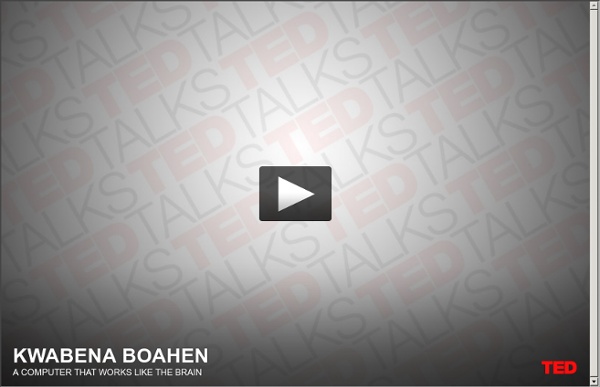



Neuron All neurons are electrically excitable, maintaining voltage gradients across their membranes by means of metabolically driven ion pumps, which combine with ion channels embedded in the membrane to generate intracellular-versus-extracellular concentration differences of ions such as sodium, potassium, chloride, and calcium. Changes in the cross-membrane voltage can alter the function of voltage-dependent ion channels. If the voltage changes by a large enough amount, an all-or-none electrochemical pulse called an action potential is generated, which travels rapidly along the cell's axon, and activates synaptic connections with other cells when it arrives. Neurons do not undergo cell division. In most cases, neurons are generated by special types of stem cells. Overview[edit] A neuron is a specialized type of cell found in the bodies of all eumetozoans. Many neurons fit the foregoing schema in every respect, but there are also exceptions to most parts of it. Anatomy and histology[edit]
Functional magnetic resonance imaging Researcher checking fMRI images Functional magnetic resonance imaging or functional MRI (fMRI) is a functional neuroimaging procedure using MRI technology that measures brain activity by detecting associated changes in blood flow.[1] This technique relies on the fact that cerebral blood flow and neuronal activation are coupled. When an area of the brain is in use, blood flow to that region also increases. The primary form of fMRI uses the Blood-oxygen-level dependent (BOLD) contrast,[2] discovered by Seiji Ogawa. The procedure is similar to MRI but uses the change in magnetization between oxygen-rich and oxygen-poor blood as its basic measure. FMRI is used both in the research world, and to a lesser extent, in the clinical world. Overview[edit] The fMRI concept builds on the earlier MRI scanning technology and the discovery of properties of oxygen-rich blood. History[edit] Three studies in 1992 were the first to explore using the BOLD contrast in humans. Physiology[edit]
Diffusion MRI Diffusion MRI (or dMRI) is a magnetic resonance imaging (MRI) method which came into existence in the mid-1980s.[1][2][3] It allows the mapping of the diffusion process of molecules, mainly water, in biological tissues, in vivo and non-invasively. Molecular diffusion in tissues is not free, but reflects interactions with many obstacles, such as macromolecules, fibers, membranes, etc. Water molecule diffusion patterns can therefore reveal microscopic details about tissue architecture, either normal or in a diseased state. The first diffusion MRI images of the normal and diseased brain were made public in 1985.[4][5] Since then, diffusion MRI, also referred to as diffusion tensor imaging or DTI (see section below) has been extraordinarily successful. In diffusion weighted imaging (DWI), the intensity of each image element (voxel) reflects the best estimate of the rate of water diffusion at that location. Diffusion[edit] Given the concentration and flux where D is the diffusion coefficient.
Episodes - Brain Science Podcast Episode 1-10 can now be purchased for download as a single zip file. Other episodes and transcripts may be purchased separately. Please see the episode show notes for links. Mind Wide Open: A general introduction to why neuroscience matters, based on Mind Wide Open: Your Brain and the Neuroscience of Everyday Life, by Steven Johnson.
Brain Atlas - Introduction The central nervous system (CNS) consists of the brain and the spinal cord, immersed in the cerebrospinal fluid (CSF). Weighing about 3 pounds (1.4 kilograms), the brain consists of three main structures: the cerebrum, the cerebellum and the brainstem. Cerebrum - divided into two hemispheres (left and right), each consists of four lobes (frontal, parietal, occipital and temporal). The outer layer of the brain is known as the cerebral cortex or the ‘grey matter’. It covers the nuclei deep within the cerebral hemisphere e.g. the basal ganglia; the structure called the thalamus, and the ‘white matter’, which consists mostly of myelinated axons. – closely packed neuron cell bodies form the grey matter of the brain. Cerebellum – responsible for psychomotor function, the cerebellum co-ordinates sensory input from the inner ear and the muscles to provide accurate control of position and movement. Basal Ganglia Thalamus and Hypothalamus Ventricles Limbic System Reticular Activating System Neurons Glia
Electroencephalography Simultaneous video and EEG recording of two guitarists improvising. Electroencephalography (EEG) is the recording of electrical activity along the scalp. EEG measures voltage fluctuations resulting from ionic current flows within the neurons of the brain.[1] In clinical contexts, EEG refers to the recording of the brain's spontaneous electrical activity over a short period of time, usually 20–40 minutes, as recorded from multiple electrodes placed on the scalp. Diagnostic applications generally focus on the spectral content of EEG, that is, the type of neural oscillations that can be observed in EEG signals. EEG is most often used to diagnose epilepsy, which causes obvious abnormalities in EEG readings.[2] It is also used to diagnose sleep disorders, coma, encephalopathies, and brain death. History[edit] Hans Berger In 1934, Fisher and Lowenback first demonstrated epileptiform spikes. In 1947, The American EEG Society was founded and the first International EEG congress was held.
Kwabena Boahen argues that the miniaturisation of transistors leads to them becomming more like synapses and less like electrical components: sometimes they don't output a current when they should and sometimes they leak a current when they shouldn't. Chipdesign neeeds a paradigm shift: not accurate central processesing the bottleneck but more connections with fuzy results. Compare this to TED talks about the brain by Henry Markram and others. by kaspervandenberg Dec 22